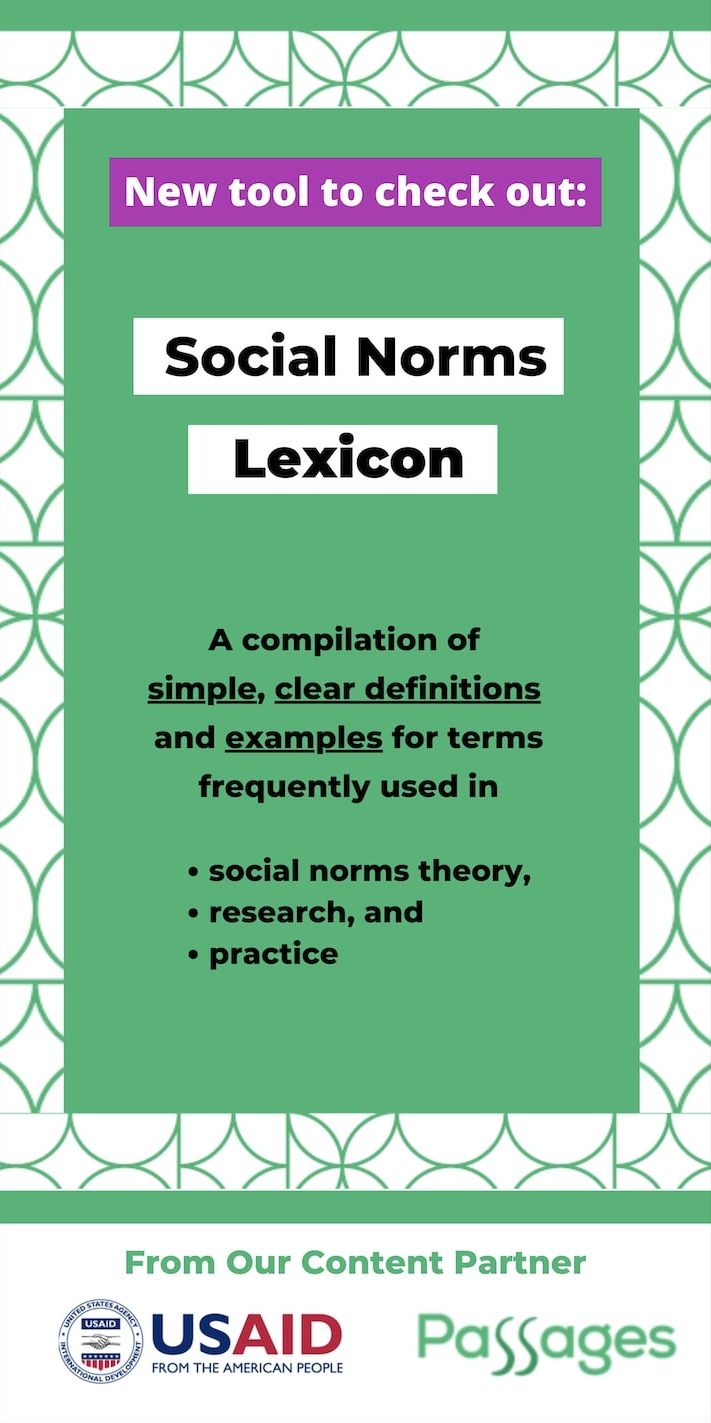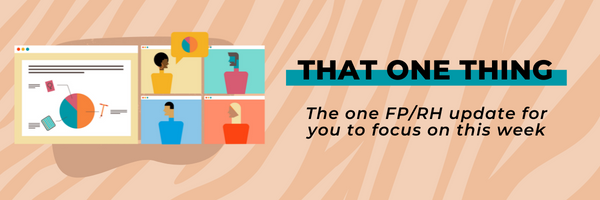Improving Knowledge Around Hot Topics in Family Planning
Q&A With FHI 360
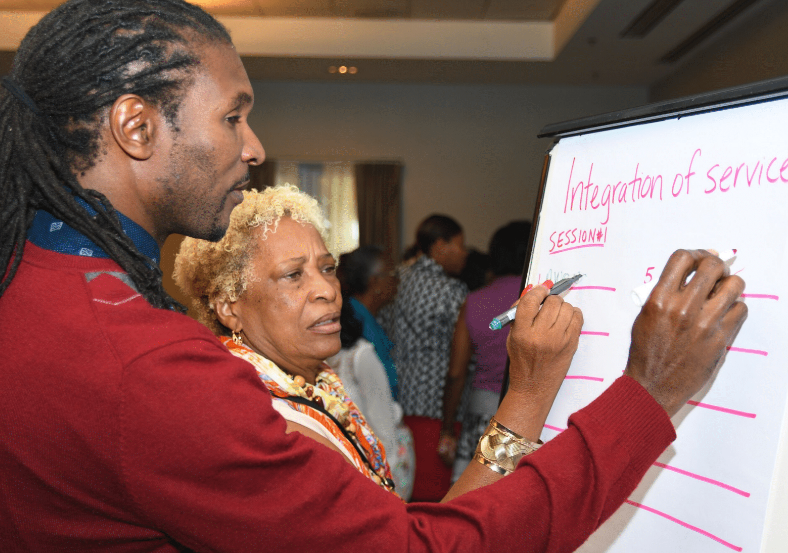
As Knowledge SUCCESS’ technical experts in family planning and reproductive health, FHI 360 is helping to ensure the project is at the forefront of family planning knowledge exchange at global and regional levels. We spoke with our FHI 360 colleagues, Frederick Mubiru (Family Planning Advisor) and Trinity Zan (Associate Director of Research Utilization), to find out what emerging topics in family planning and reproductive health are currently on their mind, and how family planning partnerships can improve knowledge and programming around these key topics.
What makes FHI 360 a fitting core partner for Knowledge SUCCESS?
Trinity: Knowledge SUCCESS fits really well into FHI 360’s overall vision and mission. When we talk about the “science of improving lives,” this means that we are committed not just to generating evidence, but ensuring that the science is clearly translated so that people know about it, understand it, and feel capable of applying it. We have been a long partner on the predecessor project, K4Health. And through this new project, we are really looking forward to continuing to make knowledge accessible, and innovating to make our work even stronger.
Fred: We bring experience in taking an “evidence to practice” – or Research Utilization – approach in programming work. We have a lot of lessons to bring to the table in regard to working with in-country partners to advance solutions, for instance, community-based family planning, and going through the various stages until it becomes institutionalized.

What topics in family planning would you say people working in this field absolutely need to stay up-to-date on?
Fred: For any family planning program to succeed, FP/RH professionals need to focus on ensuring access to high-quality services and information for all clients. This means knowing how to provide multiple channels of access, offer reliable information about contraceptive methods, and commit to a client-centered approach.
Aside from contraceptive access, people working in family planning should also stay informed about the issues that are most pressing for influential stakeholders like Family Planning 2020, Implementing Best Practices Initiative (IBP), and USAID. These areas could include meeting the contraceptive needs of diverse populations, the intersection between gender and family planning, integrating family planning into other development sectors, and using data for decision-making. By focusing on these kinds of cross-cutting issues, family planning and reproductive health programs can help support the achievement of many of the Sustainable Development Goals.
[ss_click_to_tweet tweet=”There’s so much to learn and so much anticipation, fear, and concern. Knowledge SUCCESS as a project – and our role as FHI 360 – is contributing to products and tools…” content=”There’s so much to learn and so much anticipation, fear, and concern. Knowledge SUCCESS as a project – and our role as FHI 360 – is contributing to products and tools that continually support self-care initiatives.” style=”default”]
What emerging topics do you see having potential knowledge gaps for the family planning and reproductive health community?
Trinity: Self-care is one of the big ones. Since the World Health Organization recently published new guidelines for self-care, there is a lot of work to be done to help countries understand them. Take over-the-counter provision of pills and self-injection. Knowledge SUCCESS can contribute in many ways to helping policymakers and programmers see those services as essential components of routine family planning programs.
Method choice is another exciting space. We’ve been talking about method mix for a long time. But recently there has been a shift towards a more inclusive way of thinking. How can we be more responsive to the desires and preferences of all clients? Also, with new methods still coming out, like self-injection and the hormonal IUD, again, there are lots of questions from program managers and policymakers. These emerging topics could certainly benefit from what a project like Knowledge SUCCESS brings to the table.
Fred: Knowledge SUCCESS can also bridge the gap in knowledge needs for those professionals working on multi-sectoral issues [such as the Population, Health, and Environment approach or integrating family planning with education].
What knowledge needs are you hearing first-hand from people working in this space?
Fred: I recently had a discussion with the director of a DFID-funded project dedicated to reducing high fertility rates and improving reproductive health outcomes in Uganda. The project director was interested in finding content explaining how to engage non-health stakeholders, such as business people and farmers, at sub-national levels to become champions for family planning programs. In meetings with these non-health stakeholders across various districts, he discovered that they have unique information needs, especially when it comes to communicating positively about family planning to their audiences, such as district councils and farmer’s groups, and connecting it with their usual development challenges or needs.
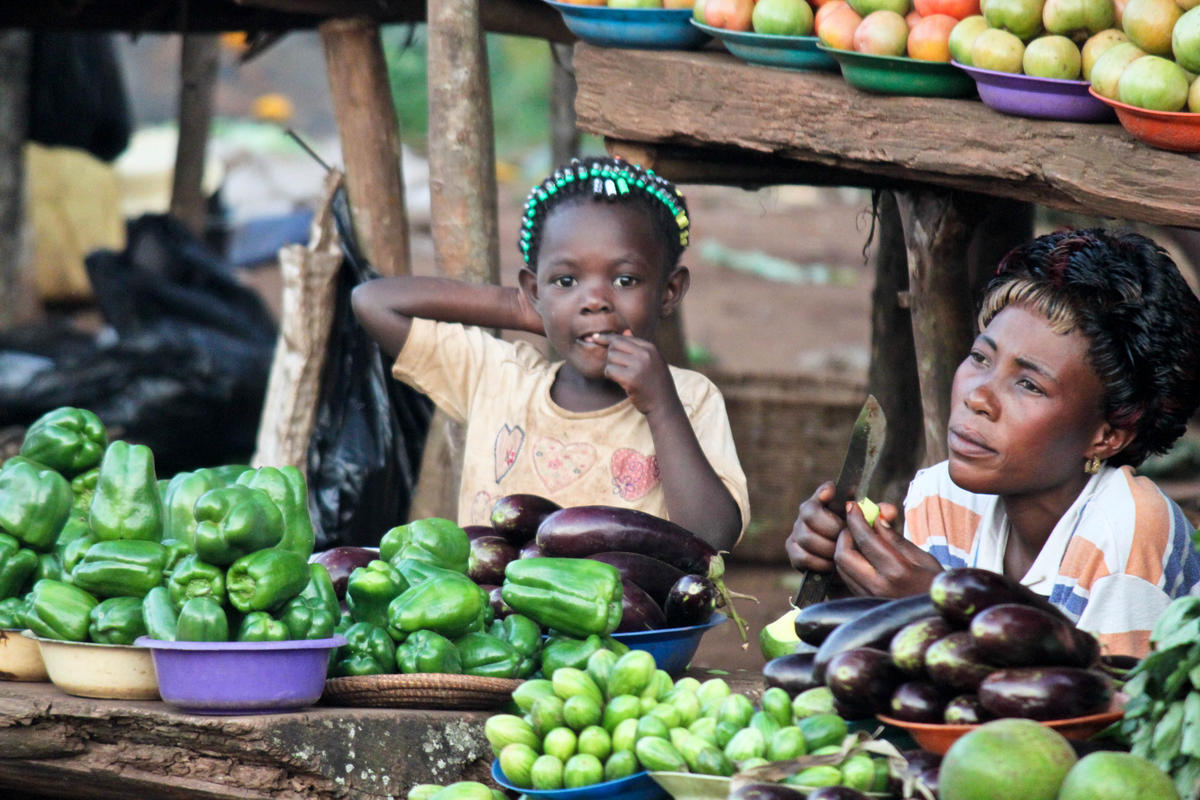
What emerging FP/RH research opportunities are you particularly excited about?
Trinity: New research on self-injection has demonstrated that this method can be easily offered and that lower-level health cadres can help women learn how to use it. Some of the more operational research is still ongoing to understand how we can make this integral for country family planning programs and support women to continuously and correctly use the method. FHI 360 has a new project called Research for Scalable Solutions, which is focused on implementation science. With this project, we will be helping to answer questions around how introducing methods like the hormonal IUS impact factors like cost-efficiency, method uptake, and continuation.
Fred: For self-care, it’s still very much in the exploration phase of introducing a new product. There’s so much to learn and so much anticipation, fear, and concern. Knowledge SUCCESS as a project – and our role as FHI 360 – is contributing to products and tools that continually support self-care initiatives. Self-care will give women agency. But it also takes away the traditional programming approach of providers administering the method. Now a woman is managing it herself. There’s a paradigm shift, and Knowledge SUCCESS can support the technical questions around that shift.
FHI 360 led the development of a gender strategy for Knowledge SUCCESS. How do you see gender playing a role in how people seek, use, and share family planning and reproductive health knowledge?
Trinity: Gender norms can certainly influence how women access information and technology. For example, women may have different schedules, which affects when they’re able to seek information on a given day. Gender norms can also impact what’s considered “appropriate behavior” for women when engaging in knowledge exchange opportunities, like professional trainings or communities of practice. So gender can be a barrier to knowledge in some ways.
With Knowledge SUCCESS, we’re seeking to raise awareness of gender within knowledge management. We’re also trying to alter our own approaches to be more gender aware. This could be as simple as purposefully seeking more female reviewers for Knowledge SUCCESS’ Global Health: Science and Practice journal articles, or creating a set of tools that would help communities of practice establish mindful gender dynamics when conducting meetings and facilitating workshops.
[ss_click_to_tweet tweet=”The workshops are extremely informative and high energy, but how can we help focal points maintain that enthusiasm and continue the dialogue outside of the meetings?” content=”The workshops are extremely informative and high energy, but how can we help focal points maintain that enthusiasm and continue the dialogue outside of the meetings?” style=”default”]
Can you describe FHI 360’s role on Knowledge SUCCESS to support knowledge exchange for organizations and partnerships working in family planning and reproductive health?
Trinity: There’s a huge potential for partnerships with groups like FP2020 and IBP that have a great reach. 69 countries have made commitments [to develop, support, and strengthen their family planning programs]. And within those countries, there’s a set of five focal points that encompass key target audiences from policymakers to donors to program managers – and to some extent – the beneficiaries themselves (youth, for instance). And through workshops, FP2020 has been doing a really good job of helping these individuals come together and share information.
Where Knowledge SUCCESS comes in is finding ways to make the learning from these workshops more strategic and continuous. The workshops are extremely informative and high energy, but how can we help focal points maintain that enthusiasm and continue the dialogue outside of the meetings? Knowledge SUCCESS is poised to do that by identifying, with FP2020 and those focal points, the channels and activities that make the most sense for them. There are a variety of opportunities, such as simple WhatsApp-style conversations around particular thematic areas, webinars in the form of “Peer Assists” where participants can delve deeper into topics, and “Skill Shots” where countries introduce a useful tool or skill that could benefit other countries in the region.
Fred: We also have communities in East Africa, like East African Community (EAC) and East, Central, and Southern African Health Community (ECSA-HC) that use their convening power to bring together governments and civil society organizations within these regions. Knowledge SUCCESS wants to continue the relationships we established with these groups through our predecessor project to infuse knowledge management within their structures and institutionalize it. This may include working with knowledge management champions within those networks, or establishing communities of practice.
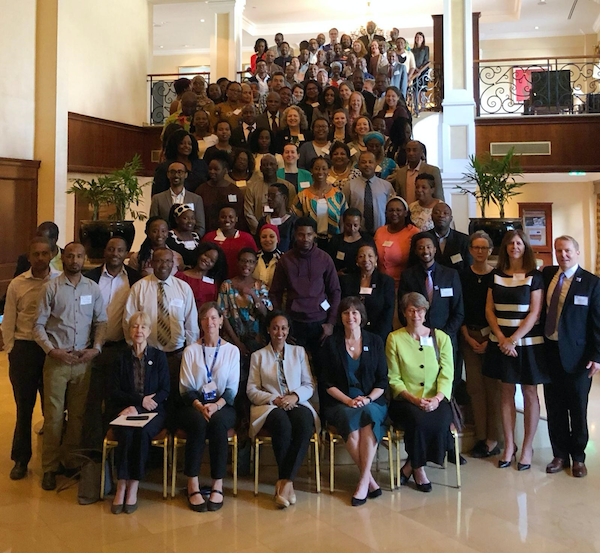
Why is regional coordination so important for FP/RH programs? And how can regional Knowledge Management champions elevate that work?
Trinity: A lot of family planning programming happens at a global level, for instance, through FP2020 or other broader WHO-related convenings. A lot of it also happens at a country level. The regional level is this really interesting in-between. Countries are hungry for that opportunity to share lessons learned with their neighbors since they have a lot in common with one another. Those opportunities for collaboration don’t happen often – and when they do – the agenda is usually jam-packed.
While it’s wonderful to exchange at a global level, sometimes your circumstances are simply too varied. Exchanging at a regional level can be even more salient. In Africa, coalitions like the Ouagadougou Partnership are already facilitating regional knowledge exchange. But by recruiting a Knowledge Management Officer – a dedicated champion for the region – Knowledge SUCCESS can help reinforce, strengthen, and amplify what’s already going on.


